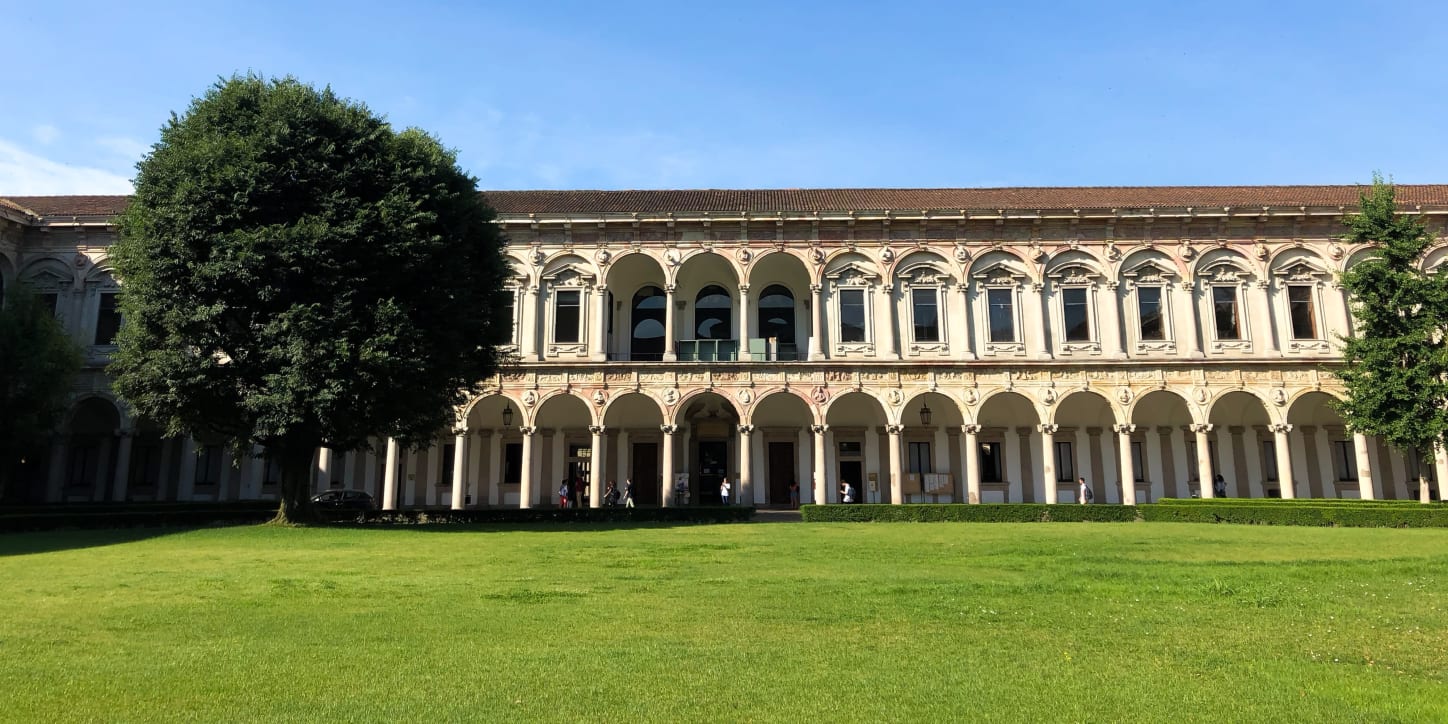
Master's Degree in Crops and Plant Sciences
Milan, Italy
DURATION
2 Years
LANGUAGES
Italian
PACE
Full time
APPLICATION DEADLINE
Request application deadline
EARLIEST START DATE
Oct 2024
TUITION FEES
Request tuition fees

STUDY FORMAT
On-Campus
Introduction
The aim of the master's is to prepare graduates with a wide cultural background, scientific training with particular reference to the method; and professional preparation in the areas of plant production, and their protection, including ornamental and urban green systems, landscaping and environmental recovery, as well as in the protection of plants from adversity. Students can choose among two curricula: crop production and plant biotechnology (for both curricula the first year will be taught in Italian, the second year in English)
Gallery
Admissions
Curriculum
Curriculum: Crop Production
Year: 1
First semester:
Compulsory
- Microbial Biotechnologies Applied to Plant Production
- Tree Growing Strategies
- Virology and Physiopathological Biotechnologies
Second semester:
Compulsory
- Herbaceous Cropping Systems
- Physiology of Plant Production
- Plant Protection Management
Open sessions:
There are no specific sessions for these activities (e.g. open online courses).
Compulsory
- English Proficiency B2
Year: 2
First semester:
Compulsory
- Basic Statistics and Experimental Design
- Plant Breeding
Second semester:
Compulsory
- Applied Entomology
- Protected Cultivation Systems
Conclusive activities:
There are no specific sessions for these activities (e.g. open online courses).
Compulsory
- Final Exam
Optional programme year
Optional:
- Low Environmental Impact Techniques and Methodologies for the Control of Plant Diseases
First semester:
- Bioinformatics for Horticultural Sciences
- Marketing to Breeding
- Proximal Sensing and Data Analysis for Agricultural Products
- Tree Propagation and Nursery Industry
Second semester:
- International Agrifood Markets and Policy
- Pest Management in Post-Harvest Food
- Planning and Realization of Urban Green Spaces
- Ree Crispres - a Workshop On Genome Editing Technologies
- Ree Fru-Bqe - Fruit Breeding and Quality Evaluation Experience
- Woody Plant Biotechnology
Open sessions:
- Other Useful Knowledge for Entering the World of Work
Curriculum: Plant Biotechnology
Year: 1
First semester:
Compulsory
- Microbial Biotechnologies Applied to Plant Production
- Tree Growing Strategies
- Virology and Physiopathological Biotechnologies Biotechnologies
Second semester:
Compulsory
- Herbaceous Cropping Systems
- Physiology of Plant Production
- Plant Protection Management
Open sessions:
There are no specific sessions for these activities (e.g. open online courses).
Compulsory
- English Proficiency B2
Year: 2
First semester:
Compulsory
- Advanced Plant Pathology
- Development of Crop Ideotypes
- Molecular Methods for Plant Breeding
- Plant Molecular Biology
Conclusive activities
There are no specific sessions for these activities (e.g. open online courses).
Compulsory
- Final Exam
Optional programme year
- Optional
- Low Environmental Impact Techniques and Methodologies for the Control of Plant Diseases
First semester:
Optional
- Bioinformatics for Horticultural Sciences
- Marketing to Breeding
- Proximal Sensing and Data Analysis for Agricultural Products
- Tree Propagation and Nursery Industry
Second semester:
Optional
- International Agrifood Markets and Policy
- Pest Management in Post-Harvest Food
- Planning and Realization of Urban Green Spaces
- Ree Crispres - a Workshop On Genome Editing Technologies
- Ree Fru-Bqe - Fruit Breeding and Quality Evaluation Experience
- Woody Plant Biotechnology
Open sessions:
There are no specific sessions for these activities (e.g. open online courses).
Compulsory
- Other Useful Knowledge for Entering the World of Work
Program Outcome
- Graduates will gain the ability to solve new problems not previously codified, also in the interdisciplinary and operational management of complex systems
- In particular, the graduate will be able to independently design and manage farms, and plan agricultural systems, and green systems on a territorial scale
- They will obtain quality agricultural production according to specific characteristics required by users
- The graduate will also be capable of setting up business management programs and territorial orientations aimed at the sustainability of agricultural activity, both nationally and internationally
Program Tuition Fee
Career Opportunities
This professional figure will find employment, also with reference to the group "Agronomists and assimilated" of the ISTAT classification of professions (intellectual, scientific, and highly specialized professions, for which a high level of knowledge and experience is required; their tasks consist in enriching existing knowledge by promoting and conducting scientific research; in interpreting concepts, scientific theories and norms; in teaching them systematically; in applying them to the solution of concrete problems), in the following sectors: in the free profession , after passing the state exam, enrolling in the Register of Agronomy and Forestry Doctors; in public research bodies, as responsible for the qualitative and quantitative improvement of agricultural crops and their defense; in the regional phytosanitary services, as inspectors for goods in transit and for nurseries or as officials in charge of drafting the regional disease protection directives; in the industries producing technical means for agriculture (seeds, fertilizers, plant protection products, etc.), with research or consultancy tasks for operators; in large-scale organized distribution, as responsible for the planning of agricultural plant production, the drafting of production regulations and the control of the healthiness of food; in the design, management and defense of ornamental, recreational and sports green; in the development and organization of technical assistance services; in rural development projects, including on an international scale, by integrating productive, managerial, environmental enhancement, and sustainability of agricultural activities skills.
